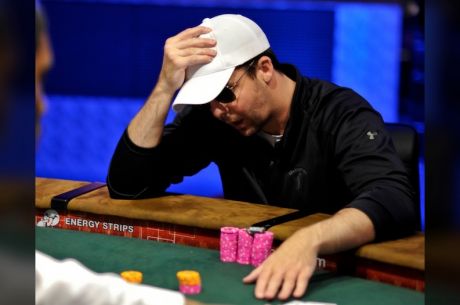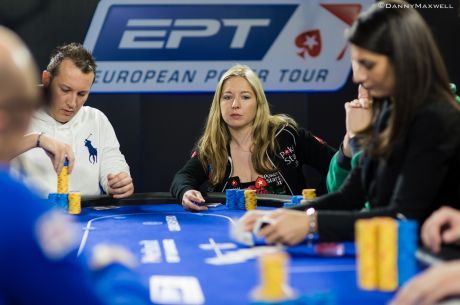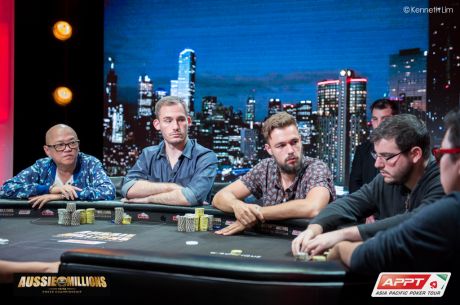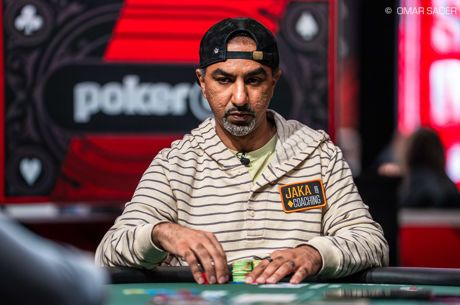Final Table Puzzles, Pt. 2: After Flopping Two Pair, a Hand Takes a Tricky Turn
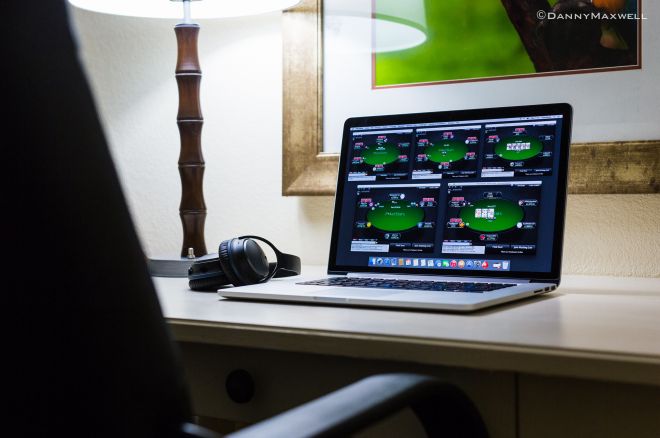
Last week we began a sojourn through a nondescript final table on PokerStars, a $30 turbo, six-max. Thankfully some descript hands came about.
When we left off the story, five players remained. A reminder of the remaining payouts:
1st: $2,205
2nd: $1,607
3rd: $1,208
4th: $840
5th: $630
Limping Into Trouble
Shortly after last week��s action, I limped on the button with Ax9x and a big chip lead. I won��t say too much about this except that doing so costs half as much as min-raising and has a 60% discount compared to making it 2.5 big blinds to go.
I had previously limped the button and been shoved on by my opponent in the big blind, a strong player, and I folded. In this instance the same player �� with 25 BB �� checked and we saw a flop of A?9?2x. My opponent checked again, I bet one big blind into the pot of almost 3.5 BB, and I was called.
The turn was a non-heart 2x, making the board A?9?2x2x. We both checked.
The river brought a Jx, also not a heart. My opponent bet out 2 BBs into the 5.5 BB pot.
We have two pair (three, really). What do you want to do?
Two Pair Is Not Two Pair
Realize this situation is not close to an opening raise with Ax9x. I repeat, not close.
My opponent hardly ever has an ace in the hole. The player would have raised, not checked, some assortment of these hands before the flop. The player would not bet a bare 9x or Jx out on the river, and if my opponent did would not call a raise. A hand like Jx9x is counterfeit to any ace as well. So again, this is never a raise.
What about a call?
Basically, in this situation, my opponent��s betting range is simple. The player either has trip twos and the best hand or has a bluff that can never win at showdown.
What hands might our opponent bluff with? This becomes tough, because a flush draw would be tempted to play the hand faster after I bet the minimum on the flop, or would have led out in the first place. Worryingly, perhaps any bluff would bet larger on the river. Because the player simply checked a hand not worth raising in the big blind, my opponent��s conceivable bluffs are some combinations of 4x3x, 5x4x, 5x3x, and flush draws like 8?6?.
Deducing Deuces
By contrast my opponent has a wide swath of hands with a 2x in them. On the river the player can have either of the two remaining deuces along with a 3x, 4x, 5x, 6x, 7x, 8x, 10x, Jx, Qx, or Kx. That��s exactly 79 combinations �� two cards, multiplied by 10 ranks and four suits, less the river jack.
That��s a lot.
The only argument actually for calling here with two pair, aces and nines, a formerly massive hand, is our price. We have to call 2 to win 7.5, and thus only have to be best 21% of the time or more often to call. Think again of those 79 combinations we counted. We need our opponent to be bluffing 21 combinations or more for us to call, since 21 and 79 is 100, which meets our 21% requirement.
If we think about 4x3x, 5x4x, and 5x3x alone, those are 48 possible combinations. Three of those are suited in hearts and thus could have played it faster. In fact, I don��t know that my opponent wouldn��t play all of those combinations faster in some way, and again, I don��t know that the player would not have bet bigger on the river. But I very much believe the player would play any bare deuce in the exact manner my opponent has.
If we add something like 12 flush draws to the mix to make 60 possible bluffs, we need my opponent to play this exact way more than one-third of the time to get our 21. That seems reasonable.
So perhaps it is close.
In Sum
Unhappily, I called. But I think I��ve made a strong case for folding. My opponent tabled Jx2x-offsuit.
This, I might point out, could have been much worse for many (dare I say) less prudent players. Betting the turn would have been met with a raise, some consternation about having top two pair, some disbelief at the prospect of facing a deuce, and so forth. If our turn bet were met with a call, another bet would have been lost on the river, likely to a check-raise all-in.
In the end the damage was quite minimal, although you may find fault with how I entreated disaster before the flop. Fair enough.
Next week we continue our journey, and �� spoiler alert �� get heads-up with this, our toughest opponent.
Gareth Chantler is a professional poker player who encourages you to check out the interviews, videos, promotions, and strategy articles at the Full Tilt Blog.
Get all the latest PokerNews updates on your social media outlets. Follow us on Twitter and find us on both Facebook and Google+!

